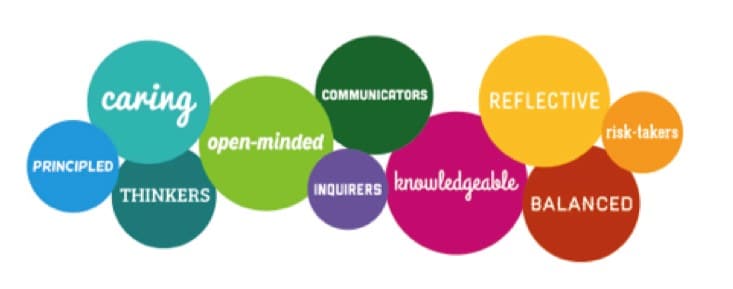Living the IB learner profile: a 10-day practice of mindfulness and self-reflection
by

In their first article IB Diploma teachers Michele Lackovic and Ashley Busse shared tips for IB learners around the world to help minimise stress and maximise success in an educational landscape dominated by COVID-19. In this article, they explore how, by living the IB Learner Profile as part of their home learning, students can continue to develop themselves as active, compassionate and lifelong learners.

Each day for the next 10 days, take 20 minutes to reflect on the learner profile trait of the day, then write your thoughts as separate entries in your English A: literature Learner Portfolio. Cultivating greater awareness of these habits and attributes can help you to use this time to grow as a person and as a scholar; they’re also the traits so highly valued by colleges and universities.
The last part of the assignment culminates in the literary world, as you connect the learner profile traits and our current global circumstances to a character you have studied in your English A: literature course. This reflection should also be included in your Learner Portfolio.
Day 1: Inquirers
About what do you find yourself curious these days? What small practices might you incorporate into your daily life in order to cultivate a passion for discovery and a spirit of inquiry? In what ways is virtual learning pushing you to become a more independent student? A better researcher*? How might you use this time to remember what it is about learning that you love? What new talent, skill, or habit might you pursue during this time at home?
Day 2: Knowledgeable
What better time than now to intentionally focus on exploring issues of both local and global significance? How, for example, is this global pandemic an issue that crosses not only geographic and cultural boundaries but also disciplinary ones? How might we research and analyse this issue through a variety of subjects, from biology and chemistry to economics and psychology, in literature and language and as living history? How might you study this issue in a scholarly way, to gain in-depth knowledge from an angle or perspective that interests you?
Day 3: Thinkers
How are both online learning and our current global situation compelling you to think about ideas, issues, the world, your community, and yourself in new and different ways? What problems have these presented, and how might you think critically and creatively about solutions? To what extent does the global pandemic raise ethical questions and inspire courage in seeking answers to them?
Day 4: Communicators
We’re certainly learning how to communicate in different ways because of social distancing and quarantines. How are you growing and developing as a communicator right now? In what ways can you use this time to become more agile as a writer, listener, and online presenter? What new tech skills are you learning because of this pandemic? How might you read, write, and reflect as you live through history?
Day 5: Principled
Virtual learning requires every single student to act with honesty and integrity. In what ways is online learning challenging you to do the right thing even when no one is watching? To work at your own pace and practice self-management? To be productive when no one requires it? To be honest in your writing and assessments? Why are honesty and integrity so important right now?
Day 6: Open-minded
In what ways have these global events challenged your thinking and beliefs? How can we stay socially connected through social distancing? How might we use this time of virtual global connectedness but physical distancing to open our hearts and minds to other cultures, stories, experiences?
Day 7: Caring
In many ways, ending the COVID-19 pandemic requires people to think and act with integrity and honesty in ways many of us have never before considered. How are you finding creative ways to serve others in need during this time? How might you share your ideas with others so that they can help? How might you collaborate with others to provide services, supplies, and support to those in need?
Day 8: Risk-takers
Perhaps never before have you been forced to approach such an unfamiliar situation and such uncertainty; how can you do so with courage and curiosity, rather than fear and self-interest? How can you use this time to explore new roles, ideas and strategies? How can you use your spirit of service and your communication skills to encourage others to do the same?
Day 9: Balanced
Because our schedules have been interrupted or destroyed (at least for the time being), it’s all the more important to cultivate and honour balance through self-management. How can you commit to creating a schedule for yourself that nurtures your physical, mental, and emotional well-being? How could you share your ideas or talents with others to help them do the same? In which aspect (physical, emotional, or intellectual) do you feel strongest? On which aspect might you need to focus and work more? That is, what are your areas of strength here, and which are your areas for growth?
Day 10: Reflective
If you’ve followed the ten-day schedule, you’ve completed nine days of productive reflection and self-assessment: well done! You’ve done some solid thinking. What are some benefits you have experienced through this practice? What have you learned about yourself, others, the world? How might you continue to create time and space for reflection going forward? How might you encourage others to do the same?
Culminating literary activity
Choose a character from a literary work in your two-year English A: literature syllabus who embodies one or more of the learner profile traits above and explain how this character would react to today’s pandemic. Think about how a specific learner profile trait (or traits) would affect a character’s actions. Adopt the author’s style and write a short scene (approximately 400 words) that includes the character’s response to current global circumstances.
* Bolded words indicate where these activities connect to IB Approaches to Learning skills (ATLs): research, social, self-management, thinking, and communication.
About the authors

Michele Lackovic co-authored Pearson’s latest edition of English A: literature for the IB Diploma. Currently she chairs the English Department at an IB continuum school in South Florida where she has taught IB DP courses since 2000. She demonstrates her passion for literature and cross-curricular connections through her English A and TOK courses, CAS coordination, and collaborations with colleagues. Michele is also an IB DP Workshop Leader and Examiner for both English A and the Extended Essay and participates in the standardisation process. She holds an MA in English literature from the Pennsylvania State University where she taught college composition and a BA in English literature from UCLA. Michele takes the IB continuum to heart as her son and daughter both participate in the IB MYP and DP Programmes.

A proud 1995 IB DP graduate herself, Ashley Denham Busse loves teaching Language A: literature. She has taught both years of the course since 2015 and is also the Extended Essay Coordinator for her IB DP programme. Ashley, along with Michele and two of their colleagues in other departments, presented a break-out session at the 2019 IB Global Conference in New Orleans, called ‘ATLs in the DP: A school-wide interdisciplinary approach connecting subject areas, the DP core, and service learning opportunities.’ Ashley has also taught college composition and literature at the Florida State University (where she received her Master of Arts degree in English literature) and at the George Washington University (where she received her PhD in English literature).


